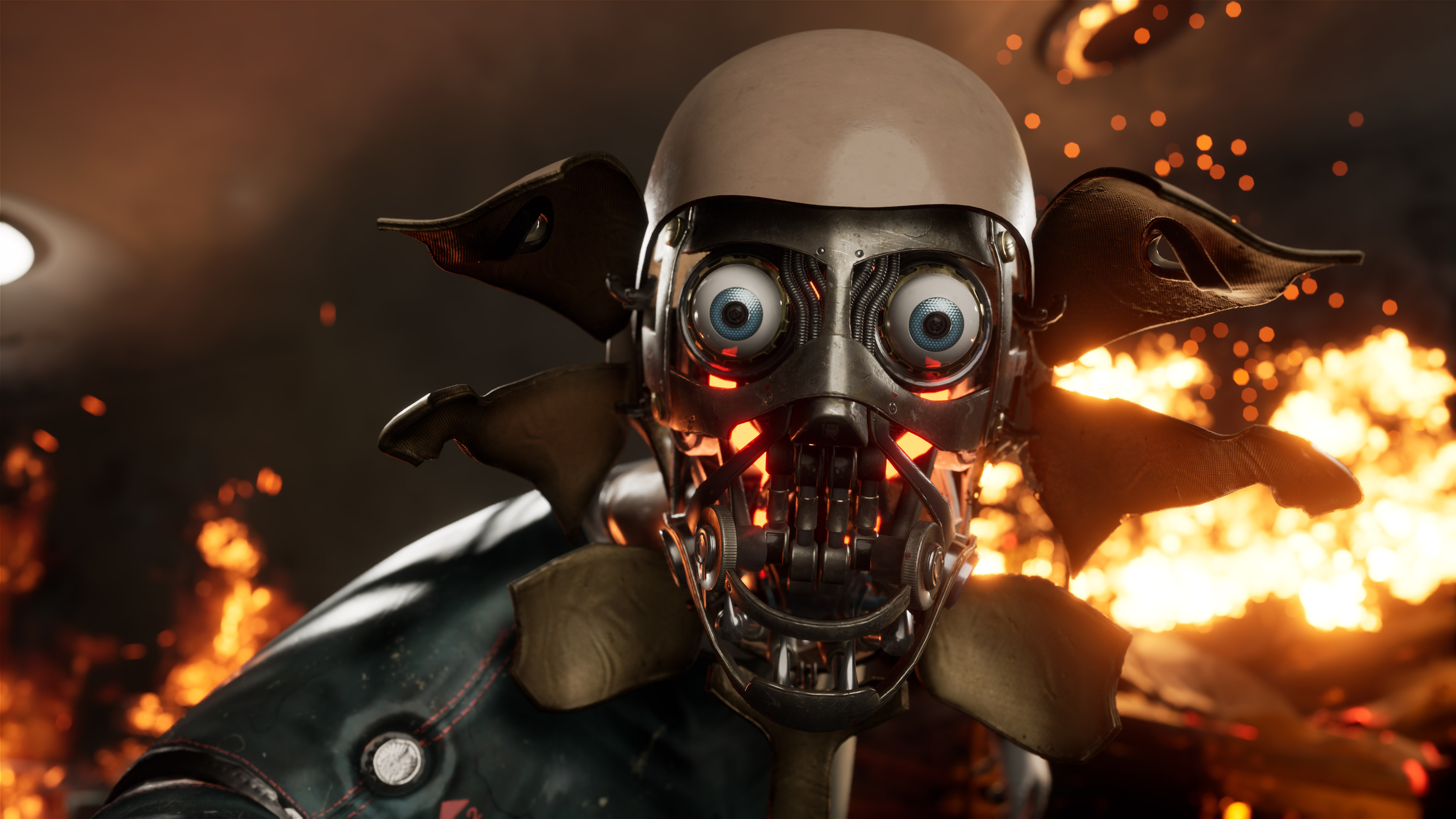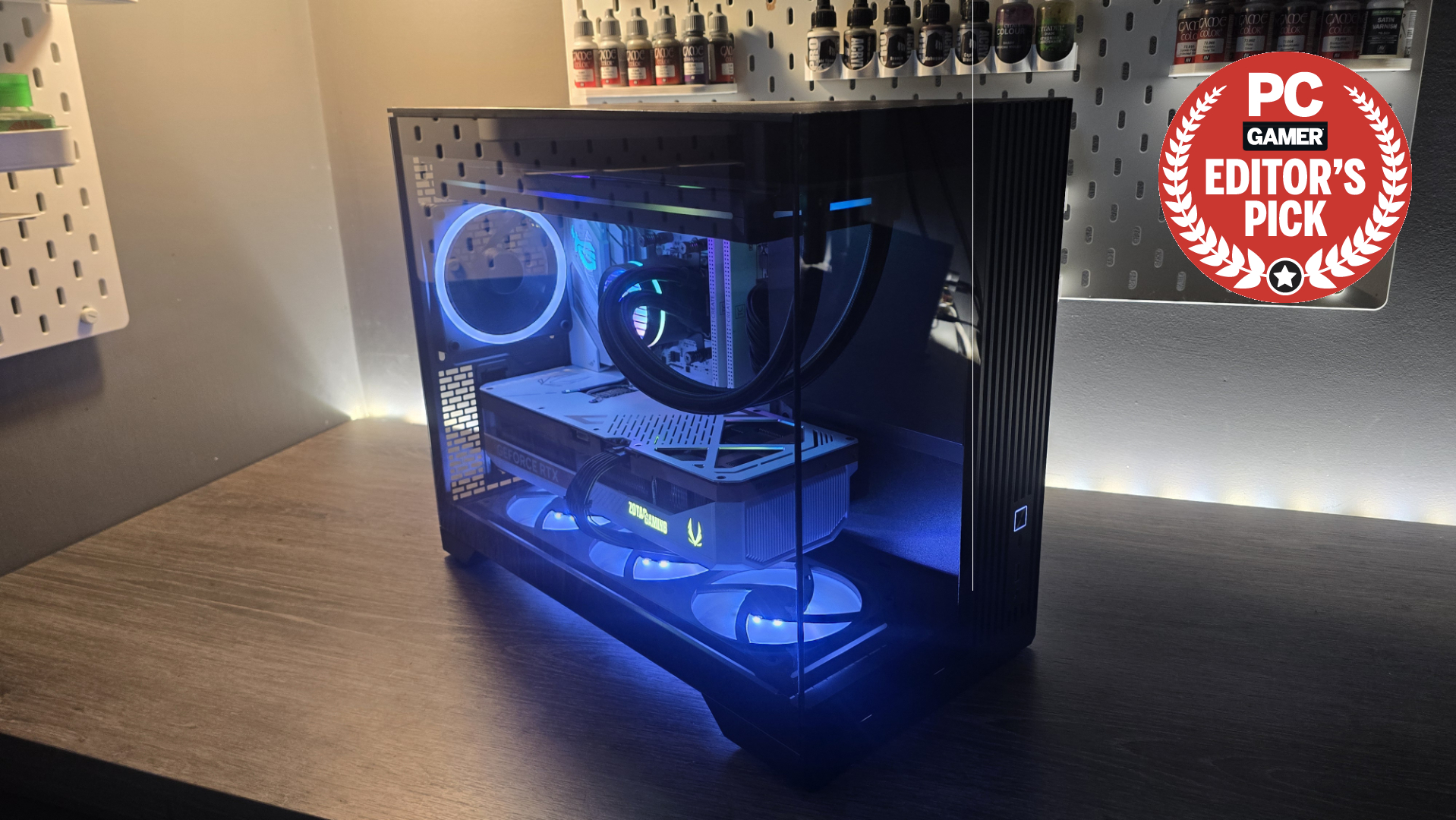Our Verdict
Atomic Heart aims high and, even if it doesn't quite pull it off, is a decent shooter in an exceptionally realised setting.
PC Gamer's got your back
What is it? A narrative FPS with light RPG elements set in a Russian Westworld
Expect to pay: $59.99 (Steam)
Developer: Mundfish
Publisher: Focus Entertainment, 4Divinity
Reviewed on: Windows 10, GeForce GTX 1070, 16GB RAM, i7-7700HQ
Multiplayer: No
Link: https://mundfish.com/
Four or five hours into Atomic Heart, you'll walk through a door and the game will swing into one of many seamless first-person cutscenes. A man points a gun at you, babbles something about blowing a giant plant to kingdom come, and your protagonist gruffly swears, complains, and sets about fetching the thing to blow up the thing. You'll soon return, shove a bunch of explosive into the plant, see it ignited by a cigarette while your character calls the plant a "fuckbag", and watch the scientist die gruesomely in the aftermath because his role in the game is over.
I didn't know whether to laugh or cry. In fact a lot of Atomic Heart will leave you grasping for purchase, as it freewheelingly veers from enormous setpieces to endless fetch quests, as critiques of Russian exceptionalism rub up against a protagonist who calls robots "fat turds" and a script that seems to have been written with the help of a swearing thesaurus. You'll gaze into the eerie, porcelain face of an android and marvel at how well the game's aesthetic captures its unsettling science fiction of humanoid robots, and then be grossed-out by a vending machine begging you to "squirt your polymer in me".
This is one of the oddest big-budget games I've played in a long time, filled with as many good ideas as bad ones, almost like it's been made without a filter. Everything went in. The game's influences are numerous—Westworld, Fallout, Arkane's Prey—but the one that looms above them all is BioShock.
Atomic Hearts' narrative-focused opening is like a communist version of Columbia and the grandeur of its sprawling research institute, a utopia-gone-wrong showcasing the best of retro-futurist Soviet robotics, makes for one breathtaking vista after another. But the influence runs far deeper than aesthetic. Combat is built around a plasmid equivalent, several of which are directly lifted from BioShock, while the narrative style of first-person talking heads, radio logs, and companions is straight from the Irrational playbook. At times Atomic Heart almost pulls it off.
The one-two punch
I don't mind that Atomic Heart copies Bioshock's electric bolt plasmid. But it annoys me to no end that it feels so underpowered.
Atomic Heart benefits from the tried-and-tested nature of these techniques, but it suffers from the fact it's so indebted to a very famous, very striking FPS from 16 years ago.
BioShock starts you off with a wrench and an electric shock attack called electro bolt, and Atomic Heart does more or less the same but with an axe. The difference is that Atomic Heart's electric shock feels… well, like it's just giving things a tickle. The combat has fairly standard basics (a melee weapon, a pistol, a shotgun, a grenade launcher) but is made nuanced by some great individual twists, like the zappy pistol you can upgrade into a death-dealing chargeable shock beam. You can customise your weapons into various damage types (electrical damage for robots, bleed damage for organic foes) and secondary effects like knockback or AoE. But ultimately no matter how you choose to skin Atomic Hearts' android enemies, combat lacks the heft of its inspirations.
One reason for this is how hard Atomic Heart leans into collecting and crafting. Throughout the game you're wearing a sentient super-glove, and everything you point it at will open and the goodies will zoom towards you. Remember the scene in Ghostbusters where the library cards start flying out of the drawers? In Atomic Heart you trigger this effect constantly and so far it hasn't gotten old. In fact I enjoy it so much I think opening space cupboards individually in Starfield is going to drive me mad.
Keep up to date with the most important stories and the best deals, as picked by the PC Gamer team.
You can similarly schloop the resources out of downed foes (whose bodies or parts convulse as the bits fly out), and whatever you're looting there's a lovely glimpse of the shiny bits flying towards you: You instantly have a sense when you've scored something good. This side of it is a delight. But using all this junk to painstakingly build and upgrade weapons means most of your equipment and attacks are unimpressive until you can grind enough loot to give them more oomph.
I don't mind that Atomic Heart copies the electro bolt plasmid. But it annoys me to no end that it feels so underpowered and, as I progressed through the upgrade tree, I was incrementally gaining abilities that the BioShock power it copied came with as standard. There were only a few rungs of the upgrade ladder to climb with plasmids in BioShock, but each one felt more substantial, and crucially the basic versions felt powerful and good to use in and of themselves. In Atomic Heart I saw no point building a new tool or weapon without having the resources to immediately upgrade it several times.
The game pretty much acknowledges this by including a system that refunds all resources for deconstructing any item. The idea is clearly that players should swap around and experiment with playstyles, but the cumbersome interface and its tiny icons mean the process is no pleasure, and most of the enemies don't encourage or demand this flexibility. The one occasion I did do this was to build a specific weapon for an annoying boss, and it worked, but I didn't especially like the weapon and ended up just deconstructing it again after the fight.
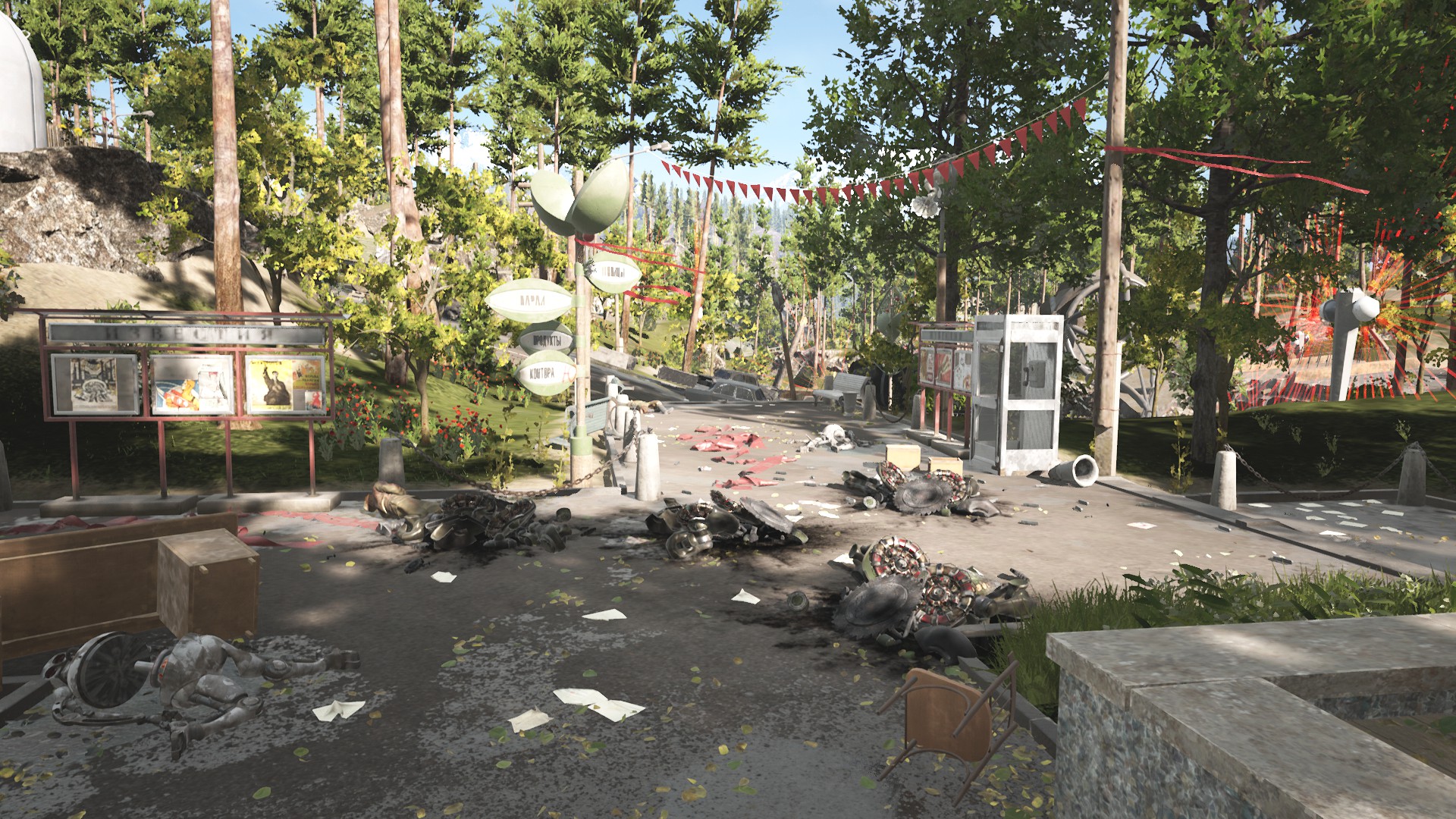
Fight for the Motherland
This is Atomic Heart writ large. It's bursting with ideas, and some of them are great and some are just ballast that only end up making the good stuff weaker. Despite my criticisms of the upgrade paths the combat is often exciting and tense, and some of the effects you can pull off—such as lifting half-a-dozen androids into the air, chain-electrocuting the lot, then smashing them down on the ground and launching a rocket—both look and feel fantastic. Special praise to an animation the androids have, where sometimes you'll blast them with a shot and they're knocked back by the impact, but uncannily flip-out of it and land in a starter's position ready to sprint at you.
Several boss fights feature incredibly frustrating QTEs. No way do I want to have to successfully pull off a quickfire QTE four minutes into a five-minute fight or insta-fail. One boss called Ivy more or less has to be fought with melee, and will grab you with a one-shot QTE attack multiple times during the fight, making for an incredibly frustrating experience.
This combat system never quite hits the heights it promises. It's like all the ingredients are there but the cake's still that tiny bit under-baked. Towards the end of BioShock and its sequels you feel like an all-powerful terror, a genetic monstrosity that swats splicers like flies. In Atomic Heart your power level amps up without ever reaching that point of potency.
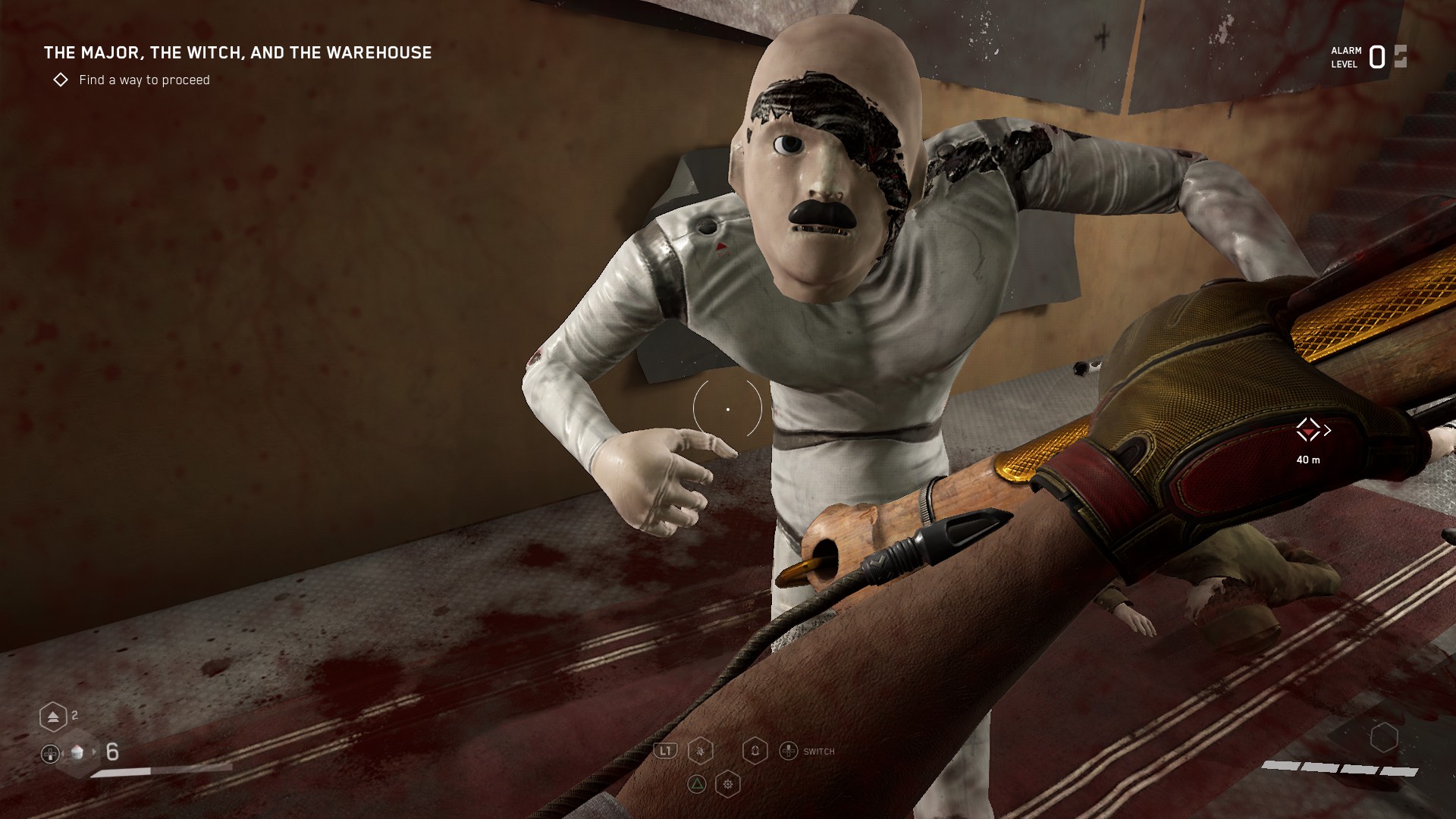
In terms of how you actually navigate this place, Atomic Heart offers one memorable and well-used idea: A viscous goop that your character can swim through in order to move vertically around certain environments. This weird-looking substance snakes around certain locales, often asking you to swim loops high above, and provides some magnificent perspectives on these environments. It's a standout idea both mechanically and visually, and the ability to hop out at any point along the tube lets you get creative with it.
Though creativity, outside of combat, is rarely necessary here. Atomic Heart features an abundance of fetch quests, then commits the cardinal sin of having a protagonist who complains about constantly doing fetch quests. This is in addition to a talking glove that, honestly, I just began to tune out after a few hours of constant yapping: It also really doesn't help that at several points the game has the glove delivering a monologue about polymers or something while you're fighting a room full of enemies.
FPS production at record levels
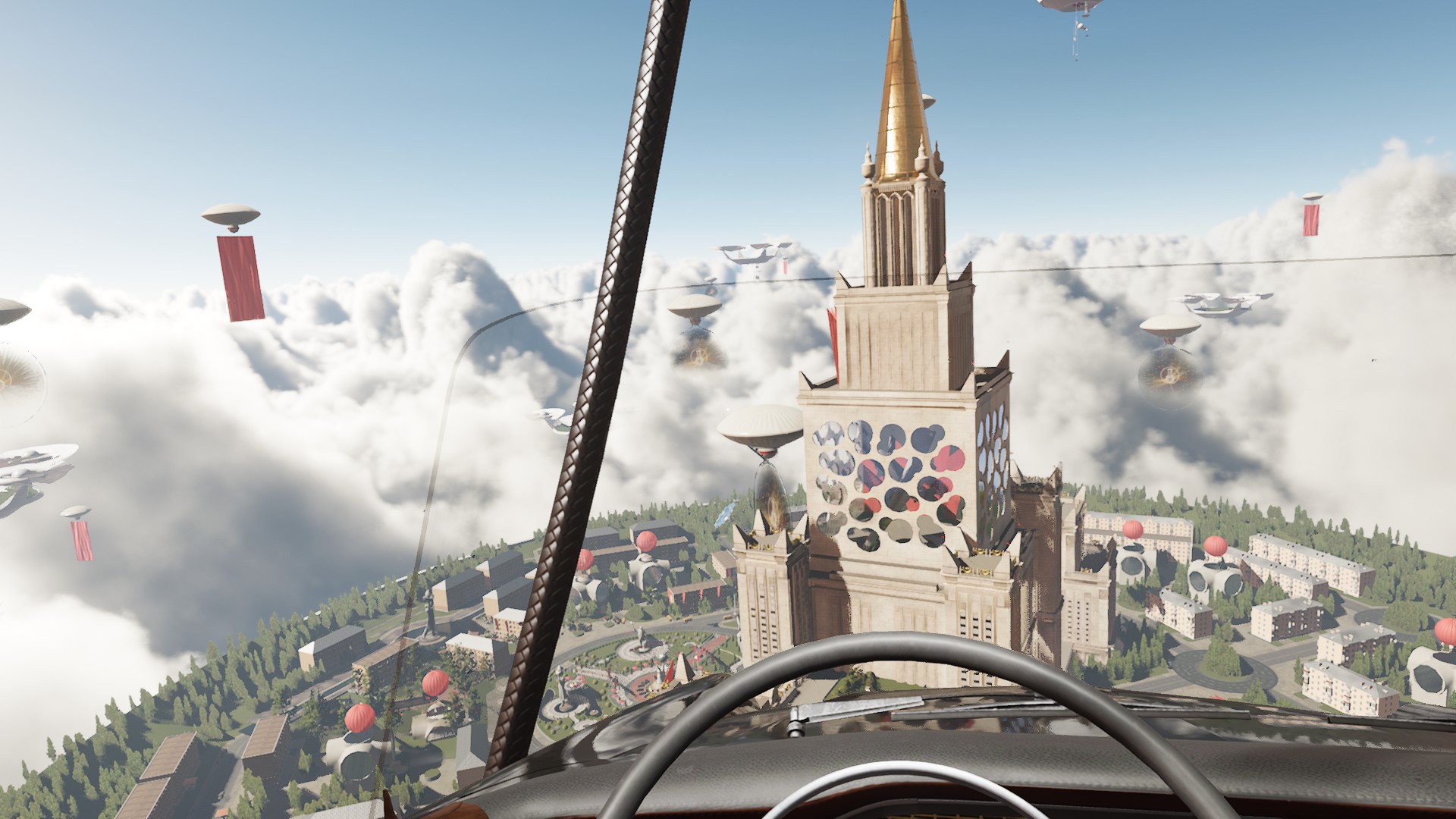
Atomic Heart arrives at a time where its critique of Soviet glory is unavoidably contextualised by what Russia is currently doing in the real world.
Atomic Heart has been the subject of recent controversy in the context of the ongoing Russo-Ukrainian war, with its developers being Russian (though based in Cyprus) and the sources of its funding being questioned. Some critics suggest that Atomic Heart represents Russian soft power, and buying it would be some sort of implicit support for the war.
Whatever one can say about the funding, this game is not a propaganda piece. In the same way that Fallout embraces Atomic-age Americana in order to oft-savagely critique American capitalism and culture, this is a Russian critique of Russian exceptionalism. The opening hours of course include sights and spectacles meant to echo the grandeur of the Russian Communist party's public events, where thousands of soldiers march beneath the hammer and sickle or a news report boasts of some new technological advance made by the comrades.
Things then begin to unravel. No-one is quite who they seem to be, and the various layers of Soviet bureaucracy in this fictional Russia are locked in an internecine war and undermining each other (all the while comparing themselves to America, naturally). You can't criticise or send-up something like Russia's political system and nostalgia for the past without including the reasons why Russians may feel some misplaced fondness for the days of grand parades and 'strong' Soviet leaders—all that hollow spectacle in Atomic Heart is there to be chipped-away to expose the rot underneath.
Atomic Heart arrives at a time where its critique of Soviet glory is unavoidably contextualised by what Russia is currently doing in the real world. The game on the one hand pines for the era where Russia led the space race, and the names of its cosmonauts travelled the world, and on the other is clear-eyed about what kind of system that was, and how its principles are still being used to subjugate a population under the guise of comradeship. The names of great Russians pop up again and again in the supporting cast in tribute, as they're used to tell a story of over-reach and ultimately the wider theme of man's inhumanity to man. I can't imagine finishing this game and thinking it's presenting Russia as some wonderland ruled by wise people for the common good.
That probably makes Atomic Heart seem like a more impressive narrative achievement than it is. There are lofty themes here and some memorable story beats, but also a bunch of ridiculous characters and setpieces that come and go in the blink of an eye, and too much of the narrative is delivered in minute-long monologues by your glove while other things are happening. I also can't get over the fact that one of your recurring buddies, Granny Zika, looks uncannily like the late queen of England and is very foul-mouthed.
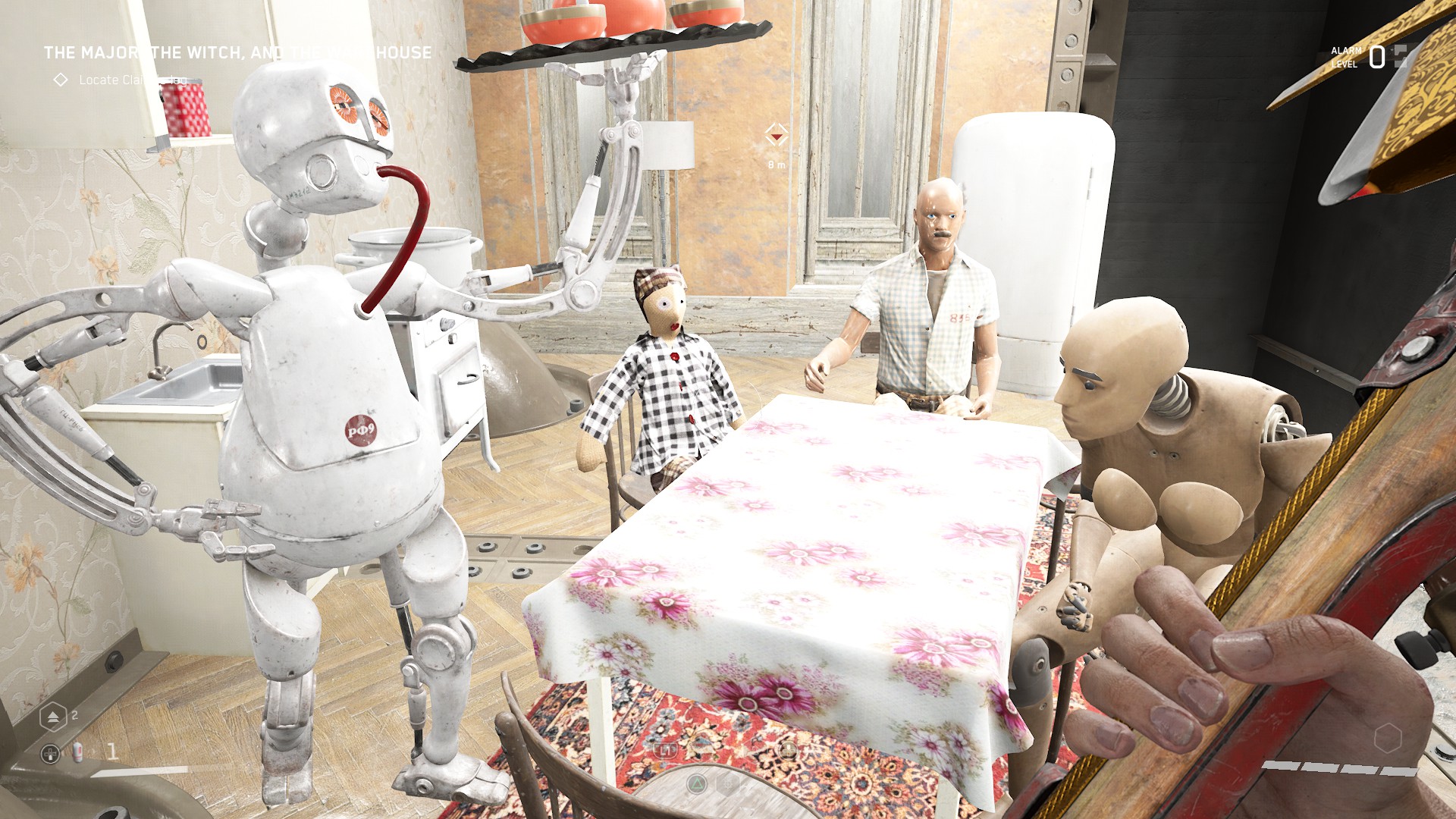
Eastworld
Atomic Heart is a surprising, ambitious, deeply flawed game that at times feels close to greatness. It will take your breath away with a setpiece one minute, then make you spend the next 10 fiddling with an annoying puzzle while the protagonist swears about how annoying this puzzle is. It's unbelievably crass in one breath, then delivers a cogent summary of contemporary issues around AI the next. I have no doubt it'll become some sort of cult classic among a particular type of FPS player.
Inspiration is always a double-edged sword because of the comparison it invites, and Atomic Heart has been heavily inspired by the past. What lies beneath its glossy exterior, though, is an all-too-human sadness about the future of technological servitude it envisions. "Would be a nice place, if everyone wasn't dead," muses the protagonist at one point, a line so banal it's almost comic. But you look at all these bodies slumped around, so many that after a while they're like wallpaper, and the cleaning robots that heedlessly go back-and-forth on their manoeuvres in the aftermath, and it somehow lands.
This game has moments of frustration alongside the wonder, and in some areas pales in comparison to those inspirations: But it is always reaching for the stars. Even if Atomic Heart never quite fully grasps them, that has to count for something.
Atomic Heart aims high and, even if it doesn't quite pull it off, is a decent shooter in an exceptionally realised setting.

Rich is a games journalist with 15 years' experience, beginning his career on Edge magazine before working for a wide range of outlets, including Ars Technica, Eurogamer, GamesRadar+, Gamespot, the Guardian, IGN, the New Statesman, Polygon, and Vice. He was the editor of Kotaku UK, the UK arm of Kotaku, for three years before joining PC Gamer. He is the author of a Brief History of Video Games, a full history of the medium, which the Midwest Book Review described as "[a] must-read for serious minded game historians and curious video game connoisseurs alike."
